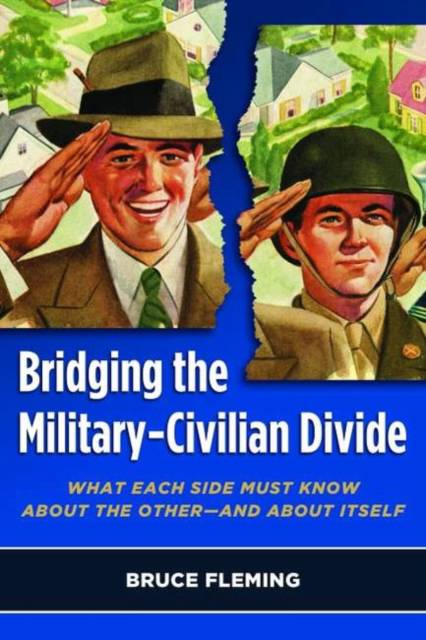
- Afhalen na 1 uur in een winkel met voorraad
- Gratis thuislevering in België vanaf € 30
- Ruim aanbod met 7 miljoen producten
- Afhalen na 1 uur in een winkel met voorraad
- Gratis thuislevering in België vanaf € 30
- Ruim aanbod met 7 miljoen producten
Zoeken
Bridging the Military-Civilian Divide
What Each Side Must Know about the Other, and about Itself
Bruce Fleming
Hardcover | Engels
€ 23,95
+ 47 punten
Omschrijving
Civilians and military personnel do not have a clear view of each other in the United States today. Conspiring against such understanding are the norms and traditions of the two cultures. On the one hand, the military is considered to like its secrecy and think of itself as morally superior to the civilians it is meant to serve. On the other hand, civilians praise or blame the armed forces based on political exigencies and generally without true comprehension of their culture. And their mutual misperceptions seem greater now than in the late 1960s and early 1970s during the Vietnam War.
Yet, as U.S. Naval Academy professor Bruce Fleming points out, the military is linked to the civilian world so fundamentally that all of us pay the price if they do not develop an appreciation of one another--but that is achievable only if each side also strives to see itself clearly. As the military fulfills its mission of protecting Americans and their way of life, civilians must also do their part and support the military through budget allocations, legislation, and enlistment. Without this shared commitment, American interests suffer as a whole.
Fleming shows how to close a military-civilian gap that yawns so large in twenty-first-century America that it potentially threatens national security and essential freedoms.
Yet, as U.S. Naval Academy professor Bruce Fleming points out, the military is linked to the civilian world so fundamentally that all of us pay the price if they do not develop an appreciation of one another--but that is achievable only if each side also strives to see itself clearly. As the military fulfills its mission of protecting Americans and their way of life, civilians must also do their part and support the military through budget allocations, legislation, and enlistment. Without this shared commitment, American interests suffer as a whole.
Fleming shows how to close a military-civilian gap that yawns so large in twenty-first-century America that it potentially threatens national security and essential freedoms.
Specificaties
Betrokkenen
- Auteur(s):
- Uitgeverij:
Inhoud
- Aantal bladzijden:
- 285
- Taal:
- Engels
Eigenschappen
- Productcode (EAN):
- 9781597974288
- Verschijningsdatum:
- 31/10/2010
- Uitvoering:
- Hardcover
- Formaat:
- Genaaid
- Afmetingen:
- 161 mm x 233 mm
- Gewicht:
- 639 g

Alleen bij Standaard Boekhandel
+ 47 punten op je klantenkaart van Standaard Boekhandel
Beoordelingen
We publiceren alleen reviews die voldoen aan de voorwaarden voor reviews. Bekijk onze voorwaarden voor reviews.











